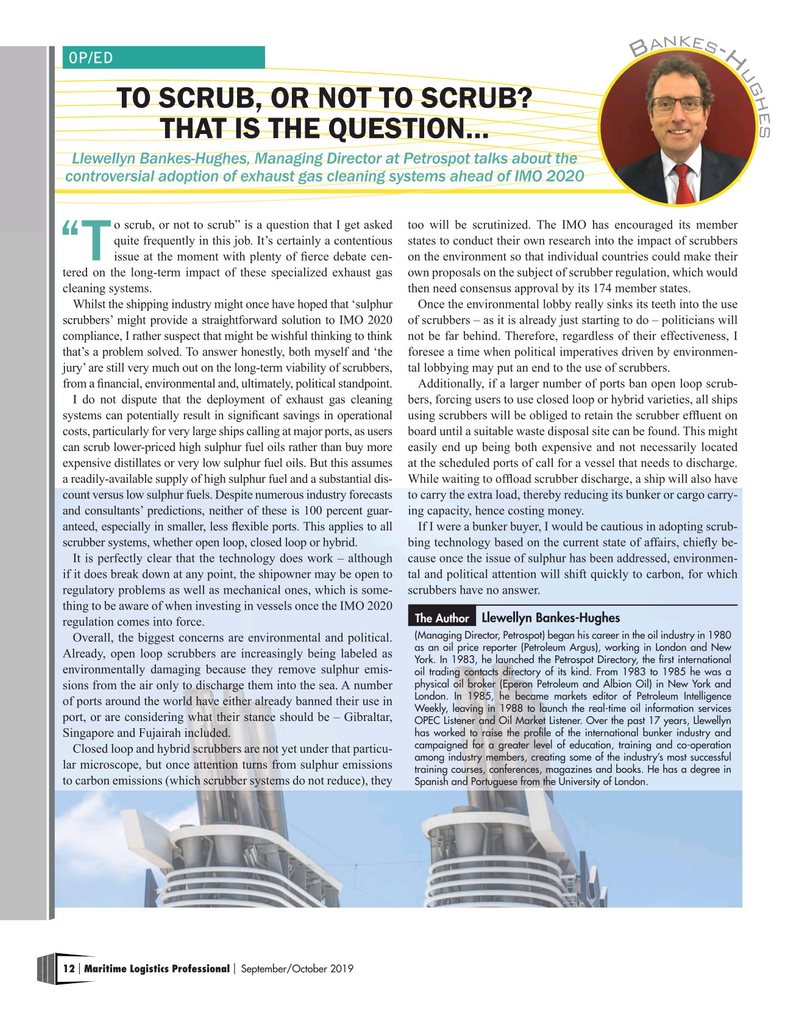
Page 12: of Maritime Logistics Professional Magazine (Sep/Oct 2019)
Energy Ports Oil-Gas-LNG
Read this page in Pdf, Flash or Html5 edition of Sep/Oct 2019 Maritime Logistics Professional Magazine
k e n s a -
H
B
OP/ED u g
H
TO SCRUB, OR NOT TO SCRUB? e s
THAT IS THE QUESTION…
Llewellyn Bankes-Hughes, Managing Director at Petrospot talks about the controversial adoption of exhaust gas cleaning systems ahead of IMO 2020 o scrub, or not to scrub” is a question that I get asked too will be scrutinized. The IMO has encouraged its member quite frequently in this job. It’s certainly a contentious states to conduct their own research into the impact of scrubbers “T issue at the moment with plenty of ferce debate cen- on the environment so that individual countries could make their tered on the long-term impact of these specialized exhaust gas own proposals on the subject of scrubber regulation, which would cleaning systems. then need consensus approval by its 174 member states.
Whilst the shipping industry might once have hoped that ‘sulphur Once the environmental lobby really sinks its teeth into the use scrubbers’ might provide a straightforward solution to IMO 2020 of scrubbers – as it is already just starting to do – politicians will compliance, I rather suspect that might be wishful thinking to think not be far behind. Therefore, regardless of their effectiveness, I that’s a problem solved. To answer honestly, both myself and ‘the foresee a time when political imperatives driven by environmen- jury’ are still very much out on the long-term viability of scrubbers, tal lobbying may put an end to the use of scrubbers.
from a fnancial, environmental and, ultimately, political standpoint. Additionally, if a larger number of ports ban open loop scrub-
I do not dispute that the deployment of exhaust gas cleaning bers, forcing users to use closed loop or hybrid varieties, all ships systems can potentially result in signifcant savings in operational using scrubbers will be obliged to retain the scrubber effuent on costs, particularly for very large ships calling at major ports, as users board until a suitable waste disposal site can be found. This might can scrub lower-priced high sulphur fuel oils rather than buy more easily end up being both expensive and not necessarily located expensive distillates or very low sulphur fuel oils. But this assumes at the scheduled ports of call for a vessel that needs to discharge. a readily-available supply of high sulphur fuel and a substantial dis- While waiting to offoad scrubber discharge, a ship will also have count versus low sulphur fuels. Despite numerous industry forecasts to carry the extra load, thereby reducing its bunker or cargo carry- and consultants’ predictions, neither of these is 100 percent guar- ing capacity, hence costing money.
anteed, especially in smaller, less fexible ports. This applies to all If I were a bunker buyer, I would be cautious in adopting scrub- scrubber systems, whether open loop, closed loop or hybrid. bing technology based on the current state of affairs, chiefy be-
It is perfectly clear that the technology does work – although cause once the issue of sulphur has been addressed, environmen- if it does break down at any point, the shipowner may be open to tal and political attention will shift quickly to carbon, for which regulatory problems as well as mechanical ones, which is some- scrubbers have no answer.
thing to be aware of when investing in vessels once the IMO 2020
Llewellyn Bankes-Hughes
The Author regulation comes into force.
(Managing Director, Petrospot) began his career in the oil industry in 1980
Overall, the biggest concerns are environmental and political. as an oil price reporter (Petroleum Argus), working in London and New
Already, open loop scrubbers are increasingly being labeled as
York. In 1983, he launched the Petrospot Directory, the frst international environmentally damaging because they remove sulphur emis- oil trading contacts directory of its kind. From 1983 to 1985 he was a physical oil broker (Eperon Petroleum and Albion Oil) in New York and sions from the air only to discharge them into the sea. A number
London. In 1985, he became markets editor of Petroleum Intelligence of ports around the world have either already banned their use in
Weekly, leaving in 1988 to launch the real-time oil information services port, or are considering what their stance should be – Gibraltar,
OPEC Listener and Oil Market Listener. Over the past 17 years, Llewellyn has worked to raise the profle of the international bunker industry and
Singapore and Fujairah included. campaigned for a greater level of education, training and co-operation
Closed loop and hybrid scrubbers are not yet under that particu- among industry members, creating some of the industry’s most successful lar microscope, but once attention turns from sulphur emissions training courses, conferences, magazines and books. He has a degree in to carbon emissions (which scrubber systems do not reduce), they
Spanish and Portuguese from the University of London.
12 Maritime Logistics Professional September/October 2019 | |

 11
11

 13
13
